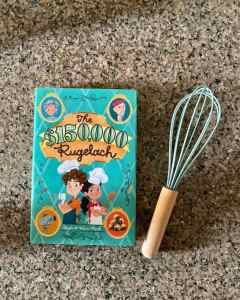Reading Middle Grade is honored to share an excerpt of Piece by Piece: How I Built My Life (No Instructions Required). This children’s non-fiction title follows a young boy born without part of an arm and how his ingenuity led him to build one from LEGO.
Humorous and uplifting…While readers needn’t be LEGO fans to admire David’s ingenuity, fellow builders may be inspired to dream up their own inventions.
– Kirkus Reviews
Two winners will receive a copy of Piece by Piece: How I Built My Life (No Instructions Required), courtesy of Amazon Crossing Kids (U.S. and Canada addresses). Enter the giveaway at the end of the post.
PIECE BY PIECE excerpt: Chapter 1

It all began in a hospital in Andorra, in room 102.
My grandparents, my great-grandmother, and my aunts were all waiting—waiting for me.
They already knew me: I was David, the strong and healthy child my parents were expecting, whom my grandparents already adored, and the whole family was impatient for me to be born.
My grandmother Basilisa, who I usually just called Abu (short for abuela or grandmother) or Abu Basi, sat there nervously rubbing her fingers, feeling emotional as she constantly twisted her wedding ring. She was waiting for her son, my father, to open the door at any moment with a smile on his lips and me in his arms, wrapped in the swaddling blanket she herself had sewn with such care, and . . .
And yes, I suppose that’s more or less what happened.
Meanwhile, my father paced the long hallways from the surgery to the waiting room, eyes full of tears, overwhelmed by the circumstances. He didn’t dare enter the room right away. Finally he opened the door—and there I was in his arms, wrapped in the swaddling clothes. But my father was missing a smile, and I was missing an arm, and the swaddling absorbed the tears that fell from his eyes. Things that happened.
“Why that sad face, Ferran?” my abuela asked, getting up. “Is everything OK? Is Nathalie OK?”
But my father couldn’t manage to speak a word, and the others couldn’t stop staring at him in fear. Everyone had paled when they saw him come in, whiter than the coat of any doctor in that hospital. And there I was, unaware of everything, of the fear my family felt, of my abuela’s unease and my father’s grief. So unaware that, well, I don’t even remember any of that, of course; I know it because I’ve been told the story so many times.
“So David . . . so . . . ,” he tried to answer.
“David what?” At that moment, my abu came closer and uncovered part of the swaddling and saw for the first time my muñón, the stump where my right arm ended. “Oh, Ferran . . .” That was all she could say.
“Just that . . . Just that . . . Otherwise the doctor says he’s perfect.”
Basi began to caress my cheeks, my brow, my little head. She grabbed my little hand, the one I do have, and rubbed it with her thumb. Then she kissed my forehead before saying, “Well, of course he’s perfect. Can’t you see?”
Curiously, that kiss I do remember.
# # #
You can imagine how the rest of that day went. And that week, and practically half my life. Looks of pity, like old friends, have always accompanied me. I even call them by their names, and we greet one another: there’s the penasco (from pena and asco in Spanish, when people feel pity but also disgust, as if my stump were going to bite them!), the penalivio (from pena and alivio, when they feel sorry for your parents but relief their own child was born with two arms), and the penobre (pena and pobre merged into a simple “oh, poor thing”). But I’ll tell you all about this later, because there’s enough material for an entire chapter or even a few of them. The thing is, my mother woke up from the anesthesia a little while later, frightened at not seeing me, and when she could, she wept, of course, because it was a surprise for everyone.
As if wanting to console us—almost without our realizing it and despite it being February 25—spring arrived early: the room filled with flowers, and the flowers hid words like “I’m so sorry,” “Have strength,” and “Our unconditional support” in the form of cards that pricked more than any thorns might. As soon as they heard the news, distant relatives, neighbors, and acquaintances all responded in this way, so that pollen flooded the room and made a permanent cloud that floated above the bouquets, which wound up piled outside, beside the door.
Right now, the truth is I wish I could go back in time and appear there, in front of room 102, to sidestep the roses, push through the daisies, open the door, and tell my parents, “Don’t worry, you’ve done a good job.”
At that moment, my missing arm seemed to them the greatest surprise of their lives. But the true surprises would come later, with what they and I would achieve. They’d wind up surprising themselves, and I’d wind up surprising the world. Mamá and Papá are now so proud of their work as parents.
# # #
Calling what’s different a disability doesn’t do more than give anyone who is different nothing to live for. But I learned this only by traveling down the difficult path.
Text copyright © 2021 by Hand Solo, S.L.
Translation copyright © 2022 by Lawrence Schimel
All rights reserved.
Courtesy of Amazon Crossing Kids
Piece by Piece Giveaway
This giveaway closes Nov 4 and is open to US & Canada addresses!
a Rafflecopter giveawayAbout the Authors

David Aguilar and his father, Ferran Aguilar, are from Andorra, in Europe. David was born missing part of one arm. At the age of nine, he designed his first prosthesis with LEGO bricks, and in high school he built the next generation, which he named the MK-1. David’s father encouraged him to make a video about his prosthesis and the huge role that LEGOs played in his life, and posted it on social media, where it went viral and changed both of their lives. In addition to telling his story in this book, David is also the protagonist of the Spanish documentary Mr. Hand Solo, which won the award for best documentary at the Boston Science Fiction Film festival. David is currently developing his own brand, Hand Solo, which will aim to benefit various organizations for the disabled and fight against the stigma of “diff-ability,” as he calls it. Follow David and Ferran on Twitter @Handsolooficial and @AguilarFerran.
Lawrence Schimel is a bilingual author who writes in both Spanish and English, with more than one hundred books to his credit. He is also a prolific literary translator, into English and into Spanish. His translated books include Wanda Gág’s Millions of Cats; George Takei’s graphic novel They Called Us Enemy; and Some Days, written and illustrated by María Wernicke; among many others. He lives in Madrid, Spain. Follow him on Twitter @lawrenceschimel.













Thank you for reviewing this book. As a middle school librarian, I am always looking for books that depict perspectives of under represented groups of people in our collections. I can see this book flying off the shelf of our school library to the hands of many students.